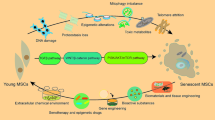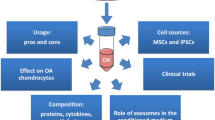Abstract
The long-term effects (~3 weeks) of two Wnt inhibitors (dickkopf [DKK]-1 and secreted frizzled-related protein [sFRP]-1), on the chondrogenic differentiation of human mesenchymal stem cells (hMSCs) was determined. Wnt inhibitors significantly increased the amount of glycosaminoglycan (GAG) in treated pellets (P < 0.05). The gene expression of COL2A1 increased and COL1A1 decreased while the gene expression of SOX-9 and COL10A1 did not change significantly after three weeks of in vitro culture. The protein expression of type II collagen significantly increased (P < 0.05) and that of type I collagen significantly decreased (P < 0.05) while SOX-9 and type X collagen protein expression was unaffected. These findings suggest that Wnt inhibitors promote the chondrogenic differentiation of hMSCs when treated for three weeks.




Similar content being viewed by others
References
Barry F, Boynton RE, Liu B et al (2001) Chondrogenic differentiation of mesenchymal stem cells from bone marrow: differentiation-dependent gene expression of matrix components. Exp Cell Res 268(2):189–200
Bodine PV, Komm BS (2006) Wnt signaling and osteoblastogenesis. Rev Endocr Metab Disord 7(1–2):33–39
Day TF, Guo X, Garrett-Beal L et al (2005) Wnt/beta-catenin signaling in mesenchymal progenitors controls osteoblast and chondrocyte differentiation during vertebrate skeletogenesis. Dev Cell 8(5):739–750
Hartmann C (2006) A Wnt canon orchestrating osteoblastogenesis. Trends Cell Biol 16(3):151–158
Hill TP, Spater D, Taketo MM et al (2005) Canonical Wnt/beta-catenin signaling prevents osteoblasts from differentiating into chondrocytes. Dev Cell 8(5):727–738
Im GI, Quan Z (2010) The effects of Wnt inhibitors on the chondrogenesis from human mesenchymal stem cells. Tissue Eng Part A 16(7):2405–2413
Im GI, Jung NH, Tae SK (2006) Chondrogenic differentiation of mesenchymal stem cells isolated from patients in late adulthood: the optimal conditions of growth factors. Tissue Eng 12(3):527–536
Johnson RL, Tabin CJ (1997) Molecular models for vertebrate limb development. Cell 90(6):979–990
Johnstone B, Hering TM, Caplan AI et al (1998) In vitro chondrogenesis of bone marrow-derived mesenchymal progenitor cells. Exp Cell Res 238(1):265–272
Kawakami Y, Rodriguez-Leon J, Belmonte JC (2006) The role of TGFbetas and Sox9 during limb chondrogenesis. Curr Opin Cell Biol 18(6):723–729
Kim HJ, Kim YJ, Im GI (2009) Is continuous treatment with transforming growth factor-beta necessary to induce chondrogenic differentiation in mesenchymal stem cells? Cells Tissues Organs 190(1):1–10
Acknowledgments
This study was supported by a grant from the Korea Healthcare Technology R&D Project, Ministry of Health & Welfare, Republic of Korea (A084039).
Author information
Authors and Affiliations
Corresponding author
Rights and permissions
About this article
Cite this article
Im, GI., Lee, JM. & Kim, HJ. Wnt inhibitors enhance chondrogenesis of human mesenchymal stem cells in a long-term pellet culture. Biotechnol Lett 33, 1061–1068 (2011). https://doi.org/10.1007/s10529-010-0514-3
Received:
Accepted:
Published:
Issue Date:
DOI: https://doi.org/10.1007/s10529-010-0514-3




